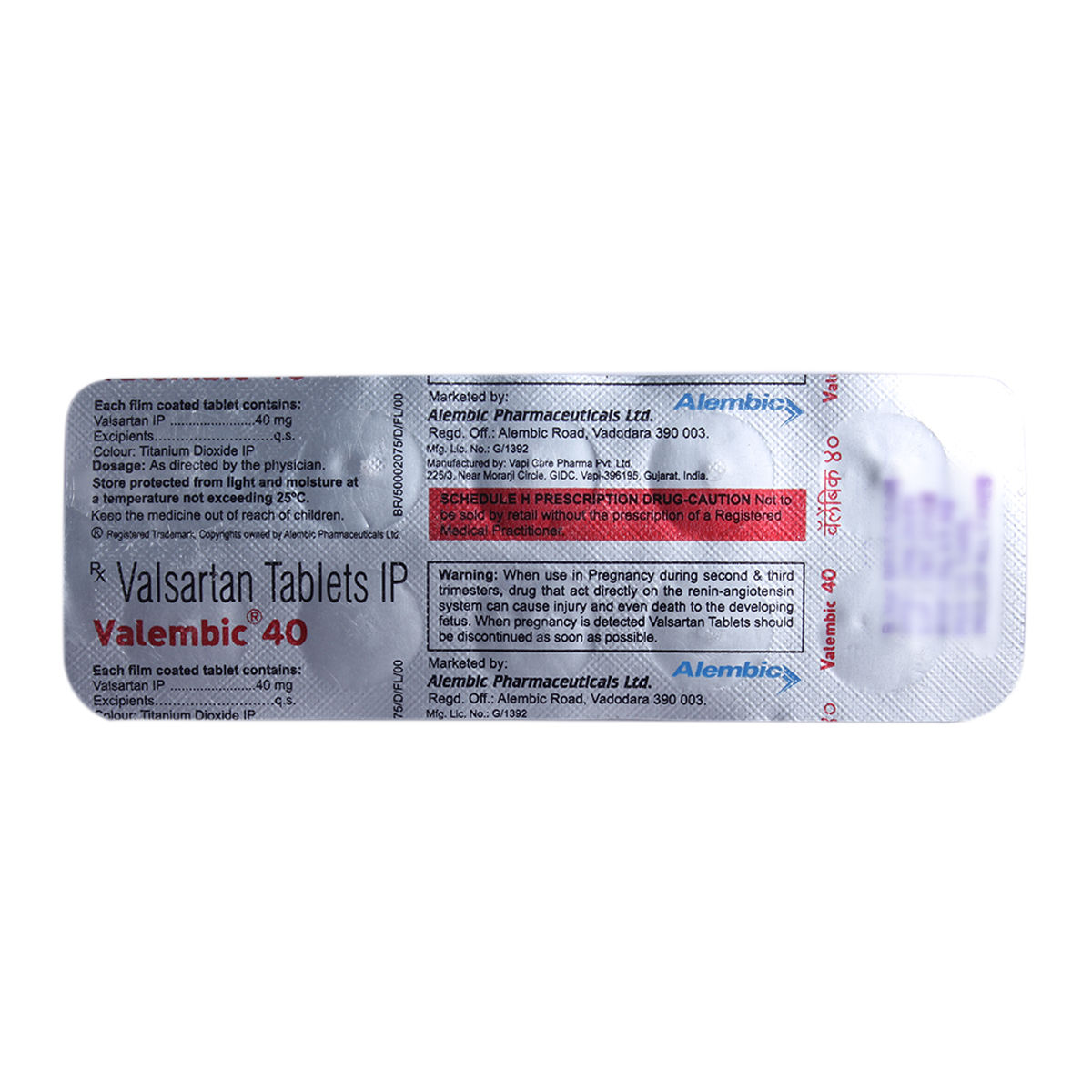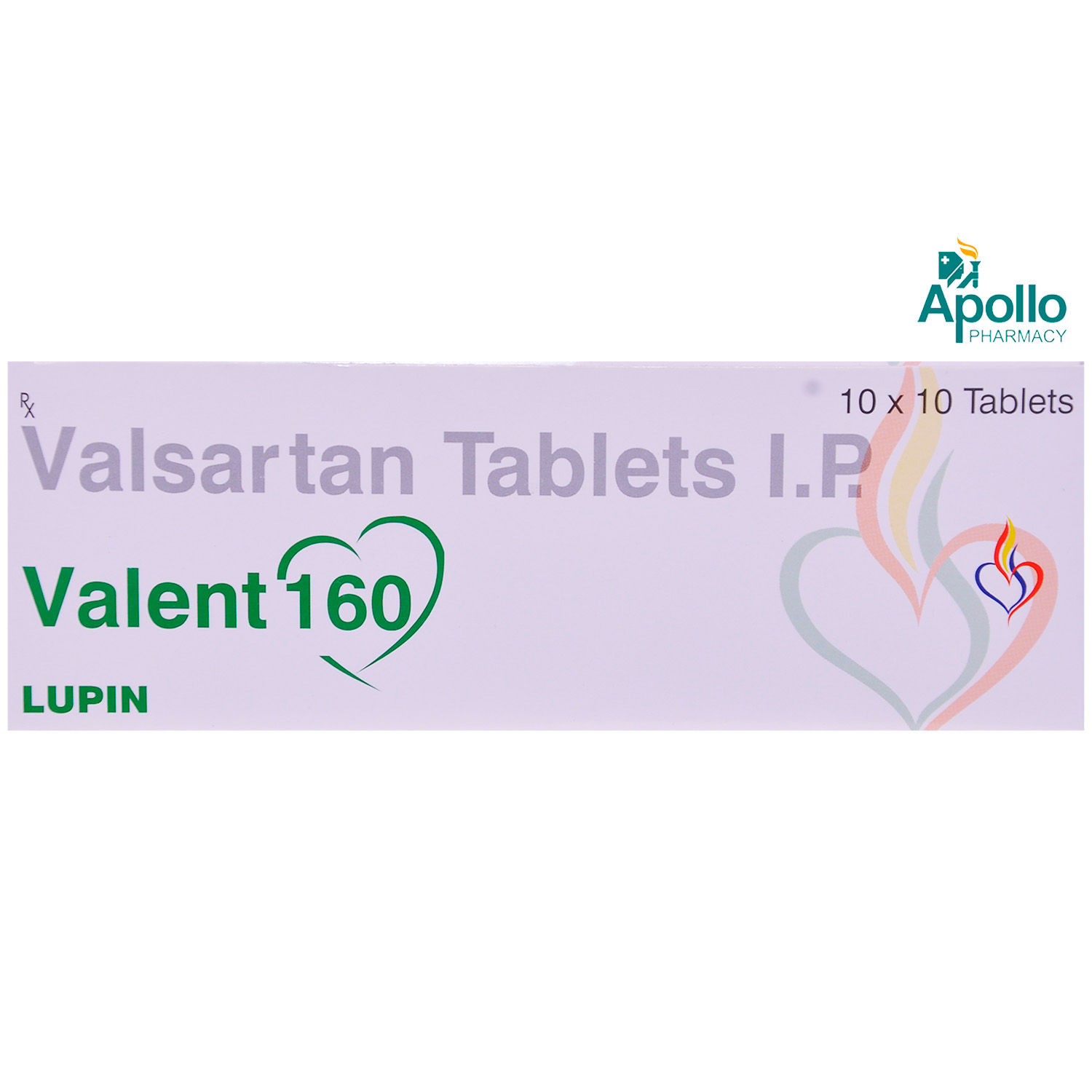Valsartan
About Valsartan
Valsartan belongs to the group of anti-hypertensive medicines called angiotensin receptor II antagonist used to treat hypertension (high blood pressure). Additionally, Valsartan is used to treat heart failure and prevention of heart attack. The blood exerts increased pressure on the walls of blood vessels leading to high blood pressure. Heart failure occurs when the heart cannot pump sufficient blood to the remaining parts of the body. A heart attack occurs due to the blockage of blood flow to the heart muscle.
Valsartan contains ‘valsartan’ that works by blocking the effect of angiotensin II receptors which tighten the blood vessels, causing a rise in blood pressure. By blocking the effect of angiotensin II receptors, Valsartan makes it easier for the heart to pump blood to all body parts by relaxing and widening the blood vessels. Thereby, Valsartan helps in lowering the blood pressure to normal.
You are advised to take Valsartan for as long as your doctor has prescribed it for you depending on your medical condition. In some cases, you may experience certain common side-effects such as dizziness, headache, abdominal pain, fatigue, diarrhoea, nausea, and vomiting. Most of these side-effects do not require medical attention and will resolve gradually over time. However, you are advised to talk to your doctor if you experience these side-effects persistently.
Try not to stop taking it on your own as it may cause sudden increase the blood pressure. Do not take Valsartan if you are pregnant, as it may cause fetal harm. Consult your doctor before taking Valsartan if you are breastfeeding. Valsartan is not recommended for children below 6 years as efficacy and safety have not been established. Valsartan may cause dizziness, so drive with caution. Avoid consuming alcohol as it might cause increased dizziness. Inform your doctor about all the medicines you are taking and your health condition to rule out any unpleasant side-effects.
Uses of Valsartan
Medicinal Benefits
Valsartan belongs to the group of anti-hypertensive medicines called angiotensin receptor II antagonists. Valsartan is used to treat hypertension (high blood pressure), heart failure and lower death risk after a heart attack. Valsartan works by blocking the effect of angiotensin II receptors which tighten the blood vessels, causing a rise in blood pressure. By blocking the effect of angiotensin II receptors, Valsartan makes it easier for the heart to pump blood to all body parts by relaxing and widening the blood vessels. Thereby, Valsartan helps in lowering the blood pressure to normal. Valsartan reduces the risk of fatal and non-fatal cardiovascular events, primarily myocardial infarctions (heart attack) and strokes. Valsartan significantly helps in reduced hospitalisation for heart failure. Valsartan helps in reducing cardiovascular mortality following myocardial infarction (heart attack).
Directions for Use
Storage
Side Effects of Valsartan
- Dizziness
- Nausea
- Vomiting
- Headache
- Abdominal pain
- Fatigue
- Diarrhoea
Drug Warnings
Do not take Valsartan if you are allergic to any of its contents, if you have severe liver disease, diabetes, impaired kidney function, or if you are taking aliskiren. Inform your doctor if you have severe heart disease, aldosteronism (a disorder in which adrenal glands make too much of a hormone called aldosterone), dehydration, liver or kidney disease, if you are taking medicines containing potassium, if you have undergone kidney transplantation or dialysis. Do not take Valsartan if you are pregnant, as it may cause fetal harm. Consult your doctor before taking Valsartan if you are breastfeeding. Valsartan is not recommended for children below 6 years as efficacy and safety have not been established. Valsartan may cause dizziness, so drive with caution. Avoid consuming alcohol as it might cause increased dizziness. Rise slowly from lying/sitting position as Valsartan may cause dizziness (orthostatic hypotension).
Drug Interactions
Drug-Drug Interactions: Valsartan may interact with painkillers (ibuprofen, naproxen, celecoxib, etoricoxib, diclofenac, aspirin), anti-psychotic (lithium), antibiotic (rifampin), immunosuppressant (cyclosporine), anti-HIV (ritonavir), anti-hypertensive (aliskiren, enalapril, captopril, lisinopril, ramipril), blood thinner (heparin), aldosterone receptor antagonist (spironolactone), diuretics, and potassium supplements.
Drug-Food Interactions: No interactions found/established.
Drug-Disease Interactions: Inform your doctor if you have diabetes, angioedema, low blood pressure, congestive heart failure, hyperkalemia (high levels of potassium), kidney or liver impairment.
Drug-Drug Interactions Checker List:
Safety Advice

Alcohol
unsafeAvoid consuming alcohol while taking Valsartan as it may cause increased dizziness.

Pregnancy
unsafeValsartan belongs to pregnancy category D. Avoid taking Valsartan if you are pregnant or think you might be pregnant, as Valsartan can cause harm to the developing fetus.

Breast Feeding
cautionIt is unknown if Valsartan passes into breastmilk. Consult your doctor if you are breastfeeding; your doctor will decide whether Valsartan can be taken by breastfeeding mothers or not.

Driving
cautionValsartan may cause dizziness, do not drive or operate heavy machinery if you feel dizzy.

Liver
cautionDose adjustment may be needed. Valsartan should be used with caution in patients with liver impairment/liver disease. Please consult your doctor if you have liver problems or any concerns regarding this.

Kidney
cautionDose adjustment may be needed. Valsartan should be used with caution in patients with kidney impairment/kidney disease. Please consult your doctor if you have kidney problems or any concerns regarding this.

Children
cautionValsartan is not recommended for children below 6 years as efficacy and safety have not been established.
Habit Forming
Diet & Lifestyle Advise
You are advised to consume low salt and low-fat diet while taking Valsartan.
Regular exercise is also recommended to complement treatment with Valsartan.
Eat a diet rich in whole grains, vegetables, fruits.
Avoid smoking and alcohol consumption.
Maintain a healthy weight with proper diet and exercise.
Managing stress with meditation, yoga, massage would also help in treating high blood pressure.
Avoid consuming food rich in potassium such as banana, broccoli, almonds, avocado, and potassium supplements.
Special Advise
Regular monitoring of blood pressure levels, kidney function and electrolyte levels while taking Valsartan is advised.
Valsartan may increase your potassium levels. Before using potassium supplements or salt substitutes that contain potassium, consult your doctor or pharmacist.
Patients Concern
Disease/Condition Glossary
Hypertension: It is a condition in which the blood exerts increased pressure on the walls of blood vessels leading to hypertension. This condition can lead to hardened arteries (blood vessels), decreasing the blood and oxygen flow to the heart. Raised blood pressure can cause chest pain (angina) and heart attack (when the blood supply to the heart is blocked). Additionally, high blood pressure also causes brain damage (stroke) and kidney failure. Symptoms of high blood pressure include headache, dizziness, nose bleed, changes in vision, chest pain, weakness and dyspnoea (shortness of breath). However, most of the time, the signs and symptoms of hypertension are none.
Heart failure: Heart failure occurs when the heart cannot pump sufficient blood to the body's remaining parts. Symptoms include fatigue, shortness of breath, rapid heartbeat, and swollen legs.
Myocardial infarction: Myocardial infarction, also known as heart attack, is a condition in which blood flow to the heart muscle is blocked. The blockade usually occurs due to the build-up of fat/cholesterol in the coronary artery. Symptoms include pain or tightness in the chest, neck, arms or back, weakness, lightheadedness, anxiety and abnormal heartbeat.
FAQs
Valsartan is used to treat hypertension (high blood pressure). Additionally, it is used to treat heart failure and prevent heart attack.
Valsartan works by blocking the effect of angiotensin II receptors which tighten the blood vessels, causing increased blood pressure. By blocking the effect of angiotensin II receptors, Valsartan makes it easier for the heart to pump blood to all body parts by relaxing and widening the blood vessels. Thereby, Valsartan helps in lowering the blood pressure to normal.
Please do not stop taking Valsartan without consulting your doctor on your own as it may lead to a rise in blood pressure. Continue taking Valsartan for as long as your doctor has prescribed it to you. Do not be reluctant to speak with your doctor if you experience any difficulty while taking Valsartan.
Orthostatic hypotension could be a side-effect of Valsartan. Orthostatic hypotension is a sudden lowering in blood pressure leading to dizziness on standing. If you experience this, do not try to stand up suddenly or start walking, instead, lie down and get up slowly only when you feel better. People taking Valsartan are advised to regularly monitor their blood pressure levels to avoid such unpleasant events.
High blood pressure increases the workload on the arteries and heart. If untreated, it could damage the heart, brain, and kidney's blood vessels, resulting in a stroke, heart failure or kidney failure. Hypertension increases the risk of heart attacks. Therefore, anti-hypertensives such as Valsartan are used to lower the blood pressure to normal, this reduces the risk of developing these disorders.
Avoid taking NSAIDs with Valsartan unless prescribed by the doctor as it could lead to an increased risk of kidney impairment and loss of anti-hypertensive effect.
Talk to your doctor before taking potassium supplements, potassium-sparing diuretics or salt substitutes along with Valsartan as it might cause an increase in serum potassium and serum creatinine levels.
It would be preferable to take the first dose at night as it might cause dizziness. The next doses can be taken at time of the day.
Valsartan starts working within 2 hours to lower the blood pressure. However, it might take 2-4 weeks to notice the full benefits.
Valsartan may worsen kidney problems in people who already have kidney disease/problems. Inform the doctor if you have kidney problems. It should be used with caution in patients with kidney problems if prescribed by the doctor.
Valsartan is not known to cause weight gain. Maintain proper weight by eating healthy food and exercising regularly.
Valsartan may affect blood glucose levels. Therefore, inform the doctor if you have diabetes. Regular monitoring of blood sugar levels is advised.
Yes, Valsartan may cause hyperkalemia (increased potassium level in blood). Consult the doctor if you notice symptoms of hyperkalemia such as tiredness, weakness, nausea, vomiting, chest pain, trouble breathing or irregular heartbeat.
No, Valsartan does not work by causing excessive urination. It works by relaxing the blood vessels and improving the blood flow.
Taking ibuprofen with Valsartan may reduce the effects of Valsartan in lowering the blood pressure. Also, it might affect kidney function when these medicines are used together. Hence, consult the doctor before taking ibuprofen with Valsartan.
Valsartan may cause side effects such as dizziness, headache, abdominal pain, fatigue, diarrhoea, nausea, and vomiting. Most of these side-effects do not require medical attention and will resolve gradually over time. However, you are advised to talk to your doctor if you experience these side-effects persistently.






